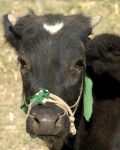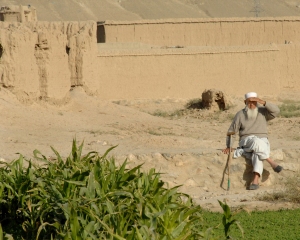Note: I attended the “Conversations and Communications: Practical Advice on Writing” conference at the Washington campus of Johns
Hopkins University. One presenter gave us a writing prompt assignment after her presentation on creative non-fiction writing. The prompt was, “Write about a time you lived unsafely but really lived.” Here’s what I wrote.
“The next convoy won’t be for another six hours,” the British soldier said. “Want to go on a foot patrol with us?”
There was a problem. Before deploying, I’d promised her I would not go “outside the wire” unless my job required it. She didn’t want me to take any unnecessary chances and wanted me to come home safely. So did I.
The idea sounded intriguing. I’d been in Afghanistanfor five-and-a-half months at the time and was due to rotate home in two weeks. I had shot photographs at a local school but hadn’t experienced how Afghans lived in their world.
It was a dilemma. Technically, I was at this British NATO base outside Kabul as part of my job. They wanted a group photograph before rotating
home the next week. Going on a foot patrol, however, wasn’t part of the job. Here was a chance to see Afghanistan. My wife wouldn’t know until afterwards.
The British sergeant tried to ease what he perceived was my anxiety. They’d patrolled the village for over two years and nothing happened. He meant it as an encouragement. This meant they were due, I thought.
The spirit of adventure and peer pressure eventually won. I decided to go.
We met in a briefing room where the team received an intelligence briefing, team assignments and safety reminders. The final was not only meant for the soldiers, but more for the two accompanying Royal Air Force officers and me. The sergeant reminded us to listen to his soldiers and also reminded his soldiers to look out for us. New people on a patrol always increased safety concerns.
Everyone geared up and headed out to the vehicles for the 10-minute trip to the village. The vehicles pulled up. Everyone received a seating assignment. My seat was in the back by the door since I was the most inexperienced in going on patrols. I had to keep an eye outside the back window and look for anyone coming up from behind meaning to harm us. One soldier stood the entire time with his upper body outside the turret ready to provide fire support.
The ride was bumpy. Dust was everywhere and quickly clouded up the inside of the truck. The Afghan interpreter had a scarf across his face to keep from breathing in the dust. I wished I had one. A kiosk in the British base sold them, but I didn’t buy one. Could I wear it with my uniform? The dust made me wish I had one.
We eventually arrived at the outpost and received another quick briefing. I was anxious about my first foot patrol and hoped it wouldn’t turn into
a combat patrol. How would I explain that to my wife?
My eyes tried to take in everything as we walked outside the outpost and through the dusty field. I was looking for a great photograph to shoot and, more importantly, any suspicious activity. It didn’t take long to learn keeping my rifle slung over my left shoulder and hold the Nikon F3 in my right wasn’t going the be easy. The simple rifle sling kept sliding off my body armor.
Working the camera with one hand, fortunately, was easy. The Nikon F3 was “automatic everything.” The camera took care of exposure and focus. I simply had to frame the shot and press the shutter release.
Photographic images kept appearing. A soldier and the translator heading out — click. A cow in the field — click. Two boys, one sitting in white
plastic patio chair with Dari writing on the wall behind them — click.
We crossed the field and headed to the nearby village. The sergeant needed to meet with the malek, the village leader, to see if he had any concerns to share or wants for his village. We reached the village and the translator began speaking with the gathering Afghan men. The sergeant was on the radio talking with the base to inform them of our progress and position. Manure lay drying in the sun near where he knelt.
A local man looked like what I had expected from photographs. He had a beard and moustache, and wore the “Massoud” pakul hat which is a flat wool hat rolled up on the sides. Its name came from the
Tajik leader known as the Lion of Panjshir. He was one of the much-loved leaders of the mujahedeen that drove out the Soviet army. He also led
the anti-Taliban Northern Alliance. Al Qaeda terrorists, posing as broadcast journalists, assassinated him Sept. 9, 2001.
The malek eventually arrived and welcomed us into his walled compound and home. We entered his living room and sat on the floor. We sat with our feet flat on the floor since it is disrespectful to show the bottom of your feet. A female RAF flight lieutenant kept her hat on out of respect for the malek. The white in the clothing of the malek and his sons created a sharp contrast to the blood red walls.
The sergeant drank the tea the malek offered. The rest of us didn’t have any. The sergeant
asked what the village needed. A visit by a medical team, the malek said. They always requested a medical visit, the sergeant said afterwards. We left and went outside after 45 minutes.
Children came to greet us hoping to receive candy. I became so engrossed in taking pictures I forgot my situational awareness. A soldier stopped me from kneeling on the ground to get a better shot. He pointed to what would have been under my knee. It was a discarded hypodermic needle. That could have created all sorts of medical issues. For the first time I noticed the trash the littered the ground. It was everywhere.
We resumed our patrol through the village. Children flocked all around us. The soldiers warned us not to give out food as that would bring more swarming children and make maintaining security more difficult. Having Afghan villagers walking among us was unnerving because we didn’t know what might happen.
I kept taking pictures as we left the village. We passed mud walls of an ancient fort. We walked by abandoned and destroyed mud homes. A soldier always walked through them to see if insurgents had stored contraband there. We passed the mud walls of the brick kilns.
We also passed a grave flying a green flag. Soldiers told me that was a sign the person buried there was murdered. I saw
off in the distance women in brightly colored clothing gathering water. They were Kuchi, a nomadic tribe in Afghanistan. We passed a Kuchi home where two young girls walked over the same trash strewn ground. The Kuchi lived on an abandoned Soviet artillery range.
Three hours later we returned to the outpost and headed home. I was grateful nothing happened on the patrol but was very grateful of the opportunity to see the real Afghanistan.











Hi Russ,
Great work. I feel honored to have inspired such a moving essay. The pictures are amazing too.
Best, Joanne Cavanaugh Simpson litdeadline.wordpress.com
Thank you very much for the kind words. I am honored you read this.
Pingback: Really Living . . . « Lit on Deadline
Agree this is an amazing essay and the pictures are great!
Sorry it’s taken me years to reply. Thank you very much.